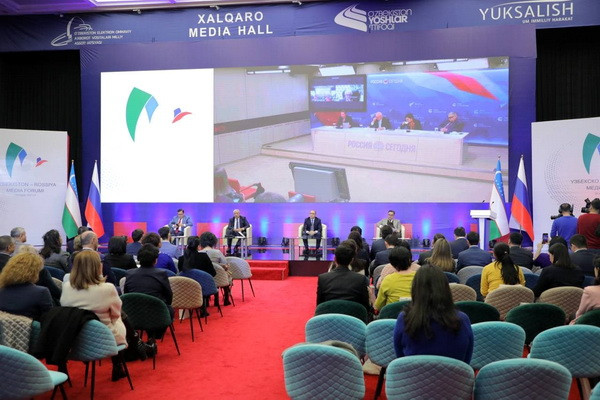On 19 November, the President of Uzbekistan paid a visit to the Russian Federation, during which a significant package of documents on bilateral cooperation in various fields was signed.
As part of the state visit, a media forum in the format of a video bridge was held, in which representatives of the mass media of Uzbekistan and Russia took part, who discussed issues of cooperation in the media sphere.
We turned to the chairman of NAESMI, one of the participants and organizer of the forum Firdavs Abdukhalikov, and talked about how bilateral relations in the media sphere are developing today.
– How do you assess the results of cooperation with foreign media over the past 5 years?
– It is worth noting that thanks to the reforms carried out by the Presidents of Uzbekistan, the media landscape has changed significantly in recent years, the media have become more open, and this, of course, could not but affect the development of relations between the Uzbek and foreign media. And in this regard, NAESMI has developed a program “New Uzbekistan. A New Look”, within the framework of which we work with Euronews, CNN, BBC,“ Russia-24 ”,“ Russia-1 ”,“ Russia-Culture ”, IA “Ferghana” and others.
The forum, in my opinion, turned out to be quite effective. We managed to listen to each other’s interests and problems, and find common ground. NAESMI stands for the systematization of relations between the two parties, for the adoption of a roadmap for the development of cooperation between the media of Uzbekistan and Russia, for the expansion of interaction in education and the exchange of information materials, the creation of documentary films, the organization and participation on a systematic basis in joint media forums.
– In what areas is NAESMI now cooperating with the Russian media?
These are three global areas that we pay special attention to – education, information exchange, and the production of documentaries. In accordance with the Media Program “New Uzbekistan. A New Look ”in the period of 3-7 May, Media Week took place, within which special meetings and master classes were held for young journalists – participants of the“ Youth Media Studios ”project with the participation of well-known Russian media outlets.
Other specialists of the Russian media regularly join the work with our young journalists. In particular, this year alone, four pieces of training of the TV reporter of the Russia-24 TV channel Boris Maksudov took place. The best materials prepared by young journalists as part of the training were broadcast on national TV channels.
A very important step in the development of cultural and humanitarian cooperation between our two countries was the signing of an agreement with the leadership of the All-Russian State Institute of Cinematography named after S.A. Gerasimova on cooperation in the field of education and the opening of a branch of VGIK in Tashkent. One of the directions of the Tashkent branch of VGIK – a film and television producer – has already become popular among the younger generation of Uzbeks.
If we talk about information cooperation – this year alone, with the support of the Rossiya Segodnya MIA, the Rossiya-24, Rossiya-1, MIR, Rossiya-Kultura TV channels, and others, more than 50 information messages were broadcast and reported on Russian TV. The focus is on the production of the Sputnik-5 vaccine in Uzbekistan, the laying of a capsule of a copper processing plant in Almalyk, the construction of Samarkand City, large energy and social facilities, celebrations and festivities, as well as cultural and humanitarian events.
– Has NAESMI, together with the agency of cinematography of Uzbekistan, also implemented several projects of a television format in co-production? Which ones can you highlight?
Hundreds of locations and objects were captured by Russian television groups, clearly demonstrating the global changes taking place in the republic in recent years. Separately, it is worth dwelling on the work of Russian TV documentary makers, directors, and producers, who set themselves the goal of “showing Uzbekistan in such a way that the viewer has never seen it. Saida Medvedeva with the film “Uzbekistan. The Newest History “, which aired on the Russia-24 TV channel, Valdis Pelsh with the unique film” Uzbekistan: Past, Present, Future “, which is being broadcast on Channel One, of course, surprise and show Uzbekistan from new and very interesting angles. The premiere of Pavel Selin’s film “Dawn of the Pearl of the East” is expected on the Russia-Culture TV channel the other day.
It was also possible to reflect the present and future not only of Uzbekistan but of the entire region in two documentaries prepared by the MIR TV and radio company – “Uzbekistan. Commonwealth duty officer “(timed to coincide with Uzbekistan’s chairmanship in the SCO),” Independence. Mission is achievable” (dedicated to the 30th anniversary of Uzbekistan’s independence).
– What are the next steps to strengthen cooperation between Russia and Uzbekistan in the media sphere?
– Immediate plans are the signing of an agreement on cooperation between NAEMI and MIA Rossiya Segodnya in terms of rendering assistance in the implementation of a new information project New Uzbekistan, which was founded by NAESMI, the Development Strategy Center, the Yuksalish National Movement, and the Union of Journalists of Uzbekistan. The first step towards rapprochement was a summer training from specialists of the Russia Segodnya MIA, which took place in Tashkent. The media campus for more than 200 young journalists was organized by a solid team of 10 leading media professionals of the Russia-Segodnya MIA – Margarita Nekrasova, Sergei Solovey, Alexander Fomin, Dmitry Budantsev, and others. The classes were aimed at immersion in the work of a news agency. The key topics of the training were the principles of a news agency, fact-checking, Internet journalism, search engines, video content and video hosting, the basics of video editing, and more.







